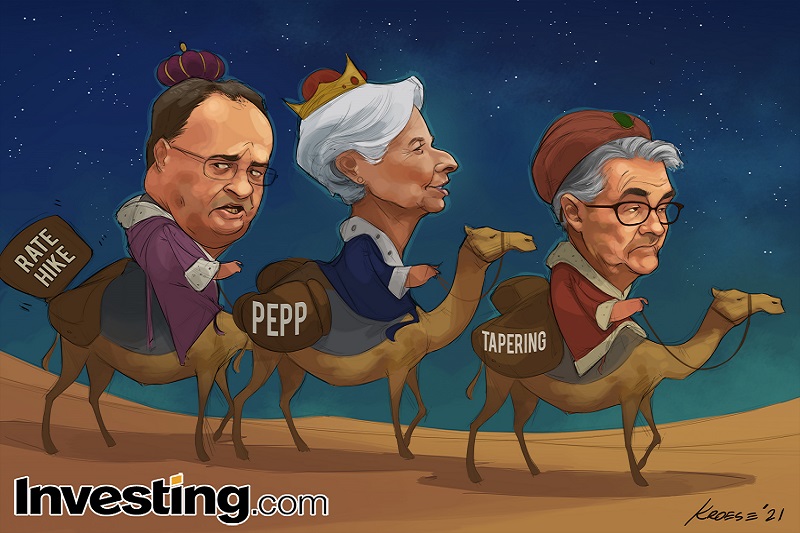By Geoffrey Smith
Investing.com -- Financial markets are in for a decidedly mixed bunch of early Christmas presents when three of the world’s most important central banks meet within the space of barely 24 hours this week.
The Federal Reserve, the European Central Bank and Bank of England are set for meetings of varying degrees of drama: the Fed is likely to announce a faster phase-out and – by implication – an earlier start to the new cycle of interest rate hikes than it had signalled at its last meeting. The ECB will have to confront for the first time the question of whether it should reimpose some kind of forma limits on its bond buying and the Bank of England will have to choose between letting inflation expectations get even further out of control, or raising interest rates just at a time when a new wave of Covid is set to slow the economy.
(As a coda, the Bank of Japan will also hold its regular policy meeting on Friday, but since Japan appears as far as ever from breaking free of the grip of deflation, the likelihood of any hint of policy tightening is close to zero.)
Consensus forecasts suggest that the Fed will announce its intention to run its asset purchases down from $120 billion a month down to zero probably no later than the end of March – a much faster withdrawal of stimulus than in the previous cycle. Such a move would be a stiff challenge to markets that have grown used to extraordinary levels of liquidity support. It would also pave the way for a first interest rate hike in the middle of next year. But the reasoning behind it is clear enough: consumer inflation is running at its highest rate since 1982 and producer prices are also rising at their highest rate in a decade. Both of this month’s reports have shown broad-based price rises and strong monthly dynamics, undermining arguments that ugly headline numbers are just the result of distortive base effects from a year earlier (even if the pandemic is still wreaking havoc with the practice of seasonal adjustment).
The Bank of England may go further still – although the chances are now firmly that it won’t. Markets had more or less priced in a 15 basis point increase in the Bank’s key rate to 0.25% before the Omicron variant of Covid-19 arrived in the U.K.
With the government now tightening its guidance on social distancing again, even the Bank’s hawks have suggested that it can afford to wait to see how bad things get with Omicron before it pulls the trigger. That’s despite the fact that annual inflation topped 5% in November, and market rates imply medium-term expectations of inflation running at over 4%.
In Frankfurt, meanwhile, the ECB will be taking a more relaxed approach. Inflation has risen in the Eurozone, too, but is almost certain to start falling by early next year as two chunky German tax increases a year ago pass out of the calculations. The lack of timely data on Eurozone wage levels make exact comparisons hard, but ECB officials are adamant that the degree of pressure from wage negotiations is nowhere near big enough to start a true wage-price spiral.
The ECB’s dilemma will be – as so often – an internal one. At the start of the pandemic, it had suspended its own self-imposed rules on how far it can intervene in government bond markets, creating a ‘Pandemic Emergency Purchase Program’ that finally gave it full flexibility to support the weaker or more indebted members of Europe’s currency union.
That program is set to expire at the end of March, and the bank’s hawks are keen to restore some kind of constraint on its bond-buying. However, analysts polled by Reuters this week still expect it to be buying 40 billion euros of bonds a month through the end of next year. Rate hikes are not expected until 2023.
As Holger Schmieding, chief economist with Berenberg Bank in Berlin, argued in a note to clients, the ECB can afford to take its time: while labor shortages do exist, they are not as acute as in the U.S. because job guarantee schemes across the region led to less labor shedding in the first place. And as the Eurozone didn’t pump as much money into households’ wallets early in the pandemic, so inflation is rising less rapidly now.
As a result, the ECB is – in contrast to the Fed - unlikely to ‘retire’ the word ‘transitory’ from its description of inflation on Thursday. As such, 2022 will start with a widening policy gap between the ECB and its peers that is likely to keep downward pressure on the euro for the foreseeable future.
